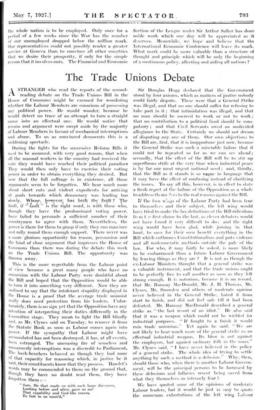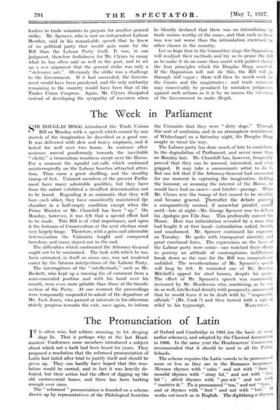The Trade Unions Debate A STRANGER who read the reports of
the second- reading debate on the Trade Unions Bill in the noose of Commons' might be excused for wondering whether the Labour Members arc conscious of possessing env political power. He would wonder, becauSe he would detect no trace of an -attempt to turn a straight cause into an effectual one. He would notice that reason and argument were swept aside by the majority of Labour Members in favour of mechanical interruptions and abuse. To us as convinced democrats this is a saddening spectacle.
During the fights for the successive Reform Bills it used to be assumed, with very good reason, that when all the manual workers in the country had received the vote they would have reached their political paradise' They would then only have to exercise their voting power in order to obtain everything they desired. But now that the full suffrage is in existence, all those arguments seem to be forgotten. We hear much more about short cuts and violent expedients for arriving at goals towards which democracy was leading too Jowly. Whose, however has been the fattlt ? The- fault, if "fault " is the right word, is with those who, though they have the predominant voting power, have failed to persuade a sufficient number of their countrymen to agree with them. Nevertheless, the power is there for them to grasp if only they can convince and rally round them enough support. There never was a more glorious opportunity for reason, persuasion and the kind of close argument that impresses the House of Commons than there was during the debate this week on the Trade Unions Bill. The opportunity was thrown away.
This is the more regrettable from the Labour point of view because a great many people who have no connexion with the Labour Party were doubtful about the Bill and hoped that the Opposition would he able to turn it into something very different. Now they arc inclined to'say that the intolerant stupidity displayed in the House is a proof that the average trade unionist really does need protection from his leaders. Unfor- tunately, there is no sign yet that the Opposition have any intention of interpreting their duties differently in the Committee stage. They mean to fight the Bill blindly and, as Mr. Clynes said on Tuesday, to remove it from the Statute Book as soon as Labour comes again. into Power. If the sympathy that Labour might have accumulated has not been destroyed, it has, at all events, been estranged. The unceasing fire of senseless and unmannerlY interruptions was a discredit to Parliament. The back-benchers behaved as though they had none of that capacity for reasoning which, in justice be it said, their Constituents knOw that they possess: Hamlet's words may be commended' to thein on the ground that, though they haVe no doubt read theM, they have forgotten them " Sure, He that made us with such large diseourso, Looking befoie and after, gave us not That, capability and .God-like reason To fust in us unwed." • Sir Douglas Hogg declared that the Government stood by four axioms, which as matters of justice nobody could fairly dispute. These were that a General Strike was illegal, and that no one should stiffer for refusiotr to take part in it ; that intimidation was illegal, and that no man should be coerced to work or not to work ; that no contribution to a political fund should be com-_ pulsory ; and that Civil Servants owed an undivided allegiance to the State. Certainly we should not dream. of disputing any one of them. Our own objections to the Bill arc, first, that it is inopportune just now, because the General Strike was such a miserable failtire that It could not be repeated so far as we can see ahead ; secondly, that the effect of the Bill will be to stir up superfluous strife at the very time when industrial peace is by far our most urgent national need ; and, thirdly, that the Bill as it stands is so vague in language that it may have the effect of confusing instead of clar4ing the issues. To say all this, however, is in effect to slite a fresh regret at the failure of the Opposition as a wlade to address tlu ms 'Ives to the real reasons against the Bill.
If the two wags of the Labour Party had been true to themselvei and their subject, the left wing would have tried to make the lax definitions of the Bill ridiculous frc m fie first clause to the last, as clever debaters would not have found it very difficult to do ; and the right wing would have been glad, while joining in that hunt, to save for their own benefit everything in the Bill which enthrones Constitutionalism and puts violence and all undemocratic methods outside the pale of the law. For who, it may fairly be asked, is more likely to be embarrassed than a future Labour Government by leaving things as they are ? It is not as though the ex-Labour Ministers thought that a general strike was a valuable instrument, and that the trade unions ought to be perfectly free to call another as soon as they felt strong enough. It is notorious, because it is on record, that Mr. Ramsay MacDonald, Mr. J. II. Thomas, Mr. Clynes, Mr. Snowden and others of moderate opinion never believed in the General Strike, hated it from start to finish, and did not feel safe till it had been defeated. Mr. Ramsay MacDonald described a general strike as " the last resort of an idiot." Ile also said that it was a weapon which could not be wielded for industrial purposes. " If fought to a finish it would ruin trade unionism." Yet again he said, " We are not likely to hear much more of the general strike as an effectual industrial weapon. Its blow is not against the employers, but against ordinary folk in the mass." Mr. dynes said, " I have never believed in the policy of a general strike. The whole idea of trying to settle anything by such a method is a delusion." Why, then, should those who, when there is another Labour Govern- !tient; will be the principal persons to he harassed by these delusions and fallacies resent being saved from what they themselves so intensely fear ?
We have quoted some of the opinions of moderate Labour leaders, but it would be just as easy to quote the numerous exhortations of the left wing Labour leaders to trade unionists to prepare for another general strike. Mr. Spencer, who is now, an independent Labour Member, said in his remarkable speech that he knew of no political party that would gain more by the Bill than the Labour Party itself. It was, in our judgment, therefore foolishness for Mr. Clynes to unsay what he has often said so well in the past, and to set up a new argument that the general strike was only a " defensive act." Obviously the strike was a challenge to the Government. If it had succeeded, the Govern- ment would have been paralysed, and the only authority remaining in the country would have been that of the Trades Union Congress. Again, Mr. Clynes dissipated instead of developing the sympathy of waverers when he bluntly declared that there was no intimidation by trade unions worthy of the name, and that such as there was was not worse than the intimidation exercised by other classes in the country.
Let us hope that in the Committee stage the Opposition will readjust their methods and try so to prune the Bill as to make it do no more than assert with perfect clarity the four principles which Sir Douglas Hogg asserted. If the Opposition will not , do this, the Bill will go through still vague ; there will then be much work for the Courts and the magistrates ; and trade unionists may conceivably be penalized by mistaken judgments against such actions as it is by no means the intention of the Government to make illegal.















































 Previous page
Previous page